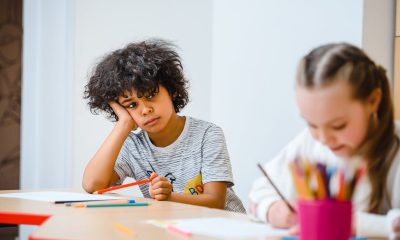Why a lack of sleep can make you more selfish
The study found that a lack of sleep makes people less empathetic, less generous and more socially withdrawn.
Published
2 years ago onBy
Talker News
By Stephen Beech via SWNS
Lack of sleep makes people more selfish, suggests a new study.
Scientists from the University of California, Berkeley, found that when people are deprived of shut-eye they have a decreased desire to help others.
Helping fellow humans is one of the foundations of civilized society.
But the new study reveals that a lack of sleep blunts the fundamental human attribute, with real-world consequences.
Lack of sleep is known to be associated with an increased risk of heart disease, depression, diabetes, and high blood pressure.
However, the new research shows that lack of sleep also impairs our basic social conscience, making us withdraw our desire and willingness to help others.
One part of the study showed that charitable giving in the week after the beginning of Daylight Saving Time, when residents of most American states “spring forward” and lose one hour of their day, dropped by 10 percent – a decrease not seen in states that do not change their clocks or when states return to standard time in the fall.
The study, led by UC Berkeley research scientist Doctor Eti Ben Simon and Professor Matthew Walker, adds to a growing body of evidence demonstrating that inadequate sleep not only harms a person's mental and physical well-being but also compromises the bonds between individuals - and even the altruistic sentiment of an entire nation.
Prof Walker said: “Over the past 20 years, we have discovered a very intimate link between our sleep health and our mental health.
"Indeed, we've not been able to discover a single major psychiatric condition in which sleep is normal.
“But this new work demonstrates that a lack of sleep not only damages the health of an individual, but degrades social interactions between individuals and, furthermore, degrades the very fabric of human society itself.
"How we operate as a social species - and we are a social species - seems profoundly dependent on how much sleep we are getting.”

Dr. Ben Simon said: “We're starting to see more and more studies, including this one, where the effects of sleep loss don't just stop at the individual but propagate to those around us.
“If you're not getting enough sleep, it doesn't just hurt your own well-being, it hurts the well-being of your entire social circle, including strangers.”
The new report describes three separate studies that assessed the impact of sleep loss on people’s willingness to help others.
In the first study: The research team placed 24 healthy volunteers in a functional magnetic resonance imager (fMRI) to scan their brains after eight hours of sleep and after a night of no sleep.
They found that areas of the brain that form the theory of mind network, which is engaged when people empathize with others or try to understand other people’s wants and needs, were less active after a sleepless night.
Dr. Ben Simon said: “When we think about other people, this network engages and allows us to comprehend what other person’s needs are: What are they thinking about? Are they in pain? Do they need help?'
“However, this network was markedly impaired when individuals were sleep deprived. It’s as though these parts of the brain fail to respond when we are trying to interact with other people after not getting enough sleep.”
In the second study: They tracked more than 100 people online over three or four nights. During that time, the researchers measured the quality of their sleep - how long they slept, how many times they woke up - and then assessed their desire to help others, such as holding an elevator door open for someone else, volunteering or helping an injured stranger on the street.
Dr. Ben Simon said: “We found that a decrease in the quality of someone’s sleep from one night to the next predicted a significant decrease in the desire to help other people from one subsequent day to the next.
“Those with poor sleep the night prior were the ones that reported being less willing and keen to help others the following day.”
The third part of the study involved mining a database of three million charitable donations in the United States between 2001 and 2016.
The researchers found a 10 percent drop in donations. However, the same drop in compassionate gift-giving was not seen in regions of the country that did not change their clocks.
Prof Walker said: “Even a very modest ‘dose’ of sleep deprivation - here, just the loss of one single hour of sleep opportunity linked to Daylight Saving Time - has a very measurable and very real impact on people’s generosity and, therefore, how we function as a connected society.
“When people lose one hour of sleep, there's a clear hit on our innate human kindness and our motivation to help other people in need.
“Looking at the big picture, we're starting to see that a lack of sleep results in a quite asocial and, from a helping perspective, anti-social individual, which has manifold consequences to how we live together as a social species.
“A lack of sleep makes people less empathetic, less generous, more socially withdrawn, and it's infectious - there is a contagion of loneliness."
“The realization that the quantity and quality of sleep affects an entire society, caused by an impairment in prosocial behavior, may provide insights into our societal state of affairs in the present day."
The researchers say that their findings, published in the journal PLoS Biology, also offer a fresh approach to improving specific aspects of our society.
Dr. Ben Simon said: "Promoting sleep, rather than shaming people for sleeping enough, could very palpably help shape the social bonds we all experience every day."
Prof Walker said: “Sleep, it turns out, is an incredible lubricant to prosocial, connected, empathic, kind and generous human behavior.
"In these divisive times, if there was ever a need for a strong, prosocial lubricant to enable the very best version of ourselves within society, now seems to be it.
“Sleep may be a wonderful ingredient that enables the alacrity of helping between human beings.”
Dr. Ben Simon said: “Sleep is essential for all aspects of our physical, mental and emotional lives.
“When sleep is undervalued in society, not only do we get sleep-deprived doctors, nurses and students, but we also suffer from unkind and less empathic interactions on a daily basis.”
She added: “It is time as a society to abandon the idea that sleep is unnecessary or a waste and, without feeling embarrassed, start getting the sleep we need.
“It is the best form of kindness we can offer ourselves, as well as the people around us.”
Stories and infographics by ‘Talker Research’ are available to download & ready to use. Stories and videos by ‘Talker News’ are managed by SWNS. To license content for editorial or commercial use and to see the full scope of SWNS content, please email [email protected] or submit an inquiry via our contact form.
You may like


New breakthrough treatment boosts cancer-fighting cells


Signs of multiple sclerosis can show up in blood years before symptoms


Why baby sharks prefer swimming in shallow water


Scientist transforms climate change data into classical music


Breakthrough may help unlock way to prevent diabetes


Having this type of job could reduce risk of memory issues
Other Stories


New breakthrough treatment boosts cancer-fighting cells
The approach involves activating the immune cells in the body and "reprogramming" them to attack and destroy the cancer cells.


One-year-old can’t stop laughing during first ride at Disneyland
"We didn't expect him to love it that much."


Dad running marathon wearing chainmail weighing over 40 pounds
A dad is attempting to break the world record for the fastest marathon while wearing chainmail.


Hero saves elderly couple by dragging them out of burning car
The Good Samaritan jumped into action after spotting the fire on his way to work.


Bomb squad seals off town after ammunition shell donated to charity shop
Staff discovered the device in a bag of donations.
Top Talkers

 Parenting2 days ago
Parenting2 days agoSingle mom details struggles of feeding her 12 kids

 Broadcast4 days ago
Broadcast4 days agoOver 40% of Americans have no clue what a 401k is

 Broadcast3 days ago
Broadcast3 days agoHow hard is it for Americans to live sustainably?

 Broadcast1 week ago
Broadcast1 week agoGrocery shopping hungry is costing Americans this much

 Funny1 week ago
Funny1 week agoCops confused by crow mimicking police siren

 Shopping1 week ago
Shopping1 week agoGrocery shopping hungry costs Americans this much every trip

 Money4 days ago
Money4 days agoOver 40% of Americans have no clue what a 401k is

 Parenting1 week ago
Parenting1 week agoIt takes this many minutes for the average American kid to get bored
